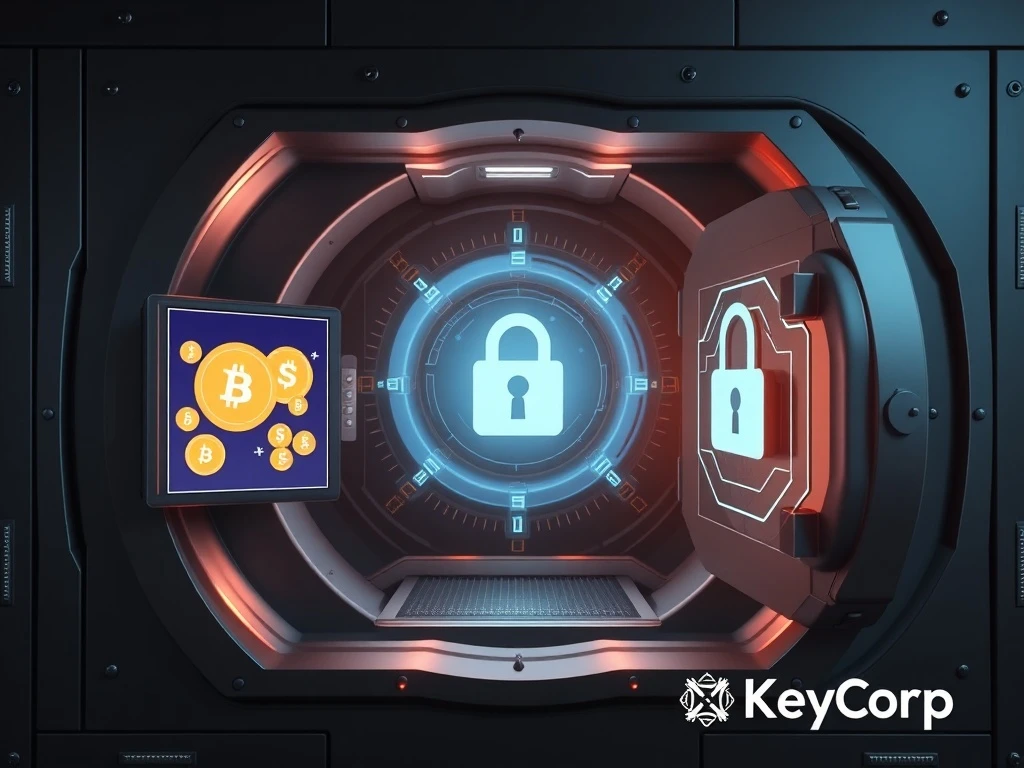KeyCorp Unveils Bold Move: Crypto Custody Services to Revolutionize Secure Storage for Institutional Demand

The financial world is undergoing a seismic shift, with traditional institutions increasingly recognizing the undeniable power and permanence of digital assets. For those keenly following the cryptocurrency space, the recent announcement from KeyCorp marks a pivotal moment. The banking giant is now openly exploring the provision of crypto custody services, a strategic move poised to redefine how large investors and institutions interact with the burgeoning digital economy. This isn’t just about holding digital coins; it’s about building trust, ensuring security, and integrating a revolutionary asset class into established financial frameworks.
Why Now? Unpacking the Surge in Institutional Demand for Crypto
The cryptocurrency market, once seen as a speculative niche, has matured significantly, drawing the attention of major players across the financial spectrum. This growing institutional demand for digital assets isn’t a fleeting trend; it’s a fundamental re-evaluation of portfolio diversification and value storage. What’s driving this accelerated interest?
- Maturation of the Crypto Market: Bitcoin and Ethereum, alongside other major cryptocurrencies, have demonstrated resilience and long-term growth potential, moving beyond their early volatility.
- Search for Yield and Diversification: In a low-interest-rate environment, institutions are actively seeking new avenues for returns and non-correlated assets to diversify their traditional portfolios.
- Increasing Regulatory Clarity: While still evolving, the regulatory landscape for digital assets is slowly becoming clearer, providing a more predictable environment for institutional engagement.
- Client Demand: Perhaps most critically, the clients themselves—hedge funds, asset managers, family offices, and even corporate treasuries—are demanding access to digital assets, necessitating secure and compliant solutions from their banking partners.
- Technological Advancements: Improvements in blockchain technology and cryptographic security have made digital asset management more robust and scalable for large-scale operations.
This confluence of factors has created an urgent need for institutional-grade infrastructure, with secure custody being at the forefront. Without reliable and regulated storage solutions, mainstream adoption by large financial entities remains significantly hampered.
KeyCorp’s Strategic Vision: A Collaborative Path to Digital Asset Management
KeyCorp CEO Greg Carmichael’s recent statements signal a clear intent: the bank is not merely observing the crypto space but actively preparing to serve its clients’ evolving needs. Carmichael emphasized a willingness to offer cryptocurrency custody services specifically tailored to customer requirements, highlighting a collaborative approach in developing these solutions. His acknowledgment that “cryptocurrency is, to some extent, a means of storing value — as long as our clients need it and wish to hold it in their wallets, we will cooperate” underscores a pragmatic, client-first strategy.
This approach stands in stark contrast to purely speculative forecasts of rapid, unbridled adoption. Instead, KeyCorp is focusing on measured progress, building solutions in direct response to genuine client demand. This aligns with KeyCorp’s historical balance of innovation and prudence, reminiscent of its early adoption of digital banking tools in the 2010s. For institutions navigating the complexities of digital assets, a partner that prioritizes flexibility and collaboration over one-size-fits-all solutions could be incredibly appealing. This measured strategy also aims to strengthen client relationships and diversify revenue streams in an increasingly competitive financial landscape.
Beyond Wallets: The Intricacies of Secure Storage for Institutions
When institutions talk about secure storage for cryptocurrencies, they are referring to a level of security, compliance, and operational robustness far beyond what a typical retail user might employ. It’s not just about a digital wallet; it involves a complex ecosystem designed to protect billions in assets from theft, loss, and regulatory breaches. Key considerations for institutional secure storage include:
- Cold Storage vs. Hot Storage: Custodians typically employ a mix. Cold storage (offline, air-gapped systems) offers maximum security against online threats, while hot storage (online, accessible systems) provides liquidity for active trading.
- Multi-Signature Wallets (Multi-Sig): Requiring multiple keys from different parties to authorize a transaction, significantly reducing the risk of single points of failure or insider threats.
- Physical Security: For cold storage, this involves highly secured vaults, biometric access controls, and armed guards, mirroring traditional bank security.
- Insurance: Obtaining specialized insurance policies that cover digital asset theft or loss, a crucial element for institutional comfort.
- Regulatory Compliance: Adhering to strict AML (Anti-Money Laundering) and KYC (Know Your Customer) regulations, as well as evolving digital asset specific rules.
- Auditing and Reporting: Providing transparent, auditable records of holdings and transactions for institutional clients and regulators.
The ability to offer such sophisticated digital asset management solutions is becoming a critical differentiator in the financial sector. Banks like KeyCorp, with their deep expertise in traditional asset custody and regulatory compliance, are uniquely positioned to bridge this gap between legacy finance and the digital asset world.
| Feature | Institutional Needs | Retail Needs |
|---|---|---|
| Security Level | Multi-signature, hardware security modules (HSMs), deep cold storage, insurance. | Software wallets, hardware wallets, basic exchange accounts. |
| Regulatory Compliance | Strict AML/KYC, SOC 2 audits, regulatory reporting. | Basic KYC for exchanges. |
| Operational Complexity | Sophisticated key management, operational redundancies, disaster recovery. | Self-management of private keys or trusting an exchange. |
| Insurance & Liability | Comprehensive insurance coverage, clear liability frameworks. | Limited or no insurance, personal responsibility for keys. |
Navigating the Regulatory Labyrinth: A Key Challenge for Crypto Custody
While the potential for crypto custody services is immense, the path is not without its hurdles. The primary challenge remains the fragmented and evolving regulatory landscape. Different jurisdictions have varying approaches to digital assets, creating complexity for banks operating across borders or even within different states. Specifics like how digital assets are classified, capital requirements for holding them, and consumer protection frameworks are still being ironed out by regulators worldwide.
KeyCorp’s emphasis on customer collaboration could be a strategic advantage in this environment. By working closely with clients, the bank can adapt its solutions to specific client needs and evolving regulatory interpretations. This agile approach signals to the broader market that legacy institutions are taking crypto seriously, potentially accelerating mainstream acceptance. The success of KeyCorp’s initiative will hinge on its ability to navigate these regulatory uncertainties while maintaining the trust and security expected of a traditional financial institution.
The Broader Landscape: How KeyCorp Fits into TradFi’s Crypto Embrace
KeyCorp’s exploration of crypto custody is not an isolated incident but rather a clear reflection of a broader industry trend. The convergence between traditional banking and digital finance is accelerating, with numerous peers making their own strategic moves:
- PNC Bank: Partnered with Coinbase to enable crypto trading for institutional clients.
- JPMorgan: Heavily invested in blockchain technology, developing its own JPM Coin for wholesale payments and exploring various digital asset applications.
- BNY Mellon: One of the first major U.S. banks to offer integrated digital asset custody services.
- Fidelity Digital Assets: A pioneering traditional financial firm offering comprehensive crypto services, including custody, for institutions.
While strategies vary—some focusing on trading, others on custody, and some on proprietary blockchain solutions—the common thread is a clear recognition of crypto’s growing role in modern investment portfolios. Banks are increasingly allocating resources to digital asset divisions, acknowledging that ignoring this asset class is no longer an option. KeyCorp’s customer-centric model, prioritizing flexibility, may particularly appeal to institutional and high-net-worth clients who require bespoke solutions, especially those in industries with high exposure to digital assets like fintech startups or decentralized finance (DeFi) platforms.
Future Outlook: Opportunities, Risks, and the Pace of Adoption
KeyCorp’s cautious yet forward-looking strategy aims to carve a significant niche in the burgeoning crypto custody market while mitigating inherent risks. The opportunities are substantial: tapping into a new, high-growth revenue stream, deepening client relationships, and positioning itself as a leader in the evolving financial ecosystem. However, challenges persist, including market volatility, technological complexities, and the aforementioned regulatory uncertainty.
The pace of institutional adoption will ultimately depend on several factors: continued maturation of the crypto market, further regulatory clarity, advancements in blockchain security, and broader macroeconomic conditions. By balancing growth opportunities with robust regulatory and operational safeguards, KeyCorp seeks to innovate responsibly. As the market continues to evolve, the bank’s ability to adapt, maintain client trust, and deliver truly secure and compliant digital asset management solutions will determine the long-term success of this initiative. This move truly reflects a broader industry recognition of crypto’s significance, with banks now competing to provide secure, customer-driven solutions in this rapidly evolving space.
Conclusion: A New Era for Financial Services
KeyCorp’s strategic pivot into cryptocurrency custody services is more than just a new offering; it’s a powerful testament to the irreversible integration of digital assets into the mainstream financial system. By prioritizing client needs and emphasizing collaboration, KeyCorp is positioning itself as a trusted partner in this new era of finance. This measured yet ambitious approach highlights a future where traditional banks play a crucial role in securing and managing the digital wealth of institutions, paving the way for broader adoption and innovation across the global economy.
Frequently Asked Questions (FAQs)
What are crypto custody services?
Crypto custody services involve the secure storage and management of digital assets (cryptocurrencies) on behalf of individuals or institutions. For institutions, this typically means sophisticated solutions that go beyond basic digital wallets, incorporating advanced security measures, regulatory compliance, and robust operational frameworks to protect large volumes of assets from theft, loss, or unauthorized access.
Why is KeyCorp entering the crypto custody market now?
KeyCorp is entering the market primarily due to rising institutional demand for secure and regulated digital asset management solutions. As more hedge funds, asset managers, and corporate treasuries seek exposure to cryptocurrencies, they require trusted banking partners to provide compliant and highly secure storage, which traditional banks like KeyCorp are well-positioned to offer.
What makes institutional crypto storage different from retail storage?
Institutional crypto storage requires a much higher level of security, compliance, and operational complexity. This includes extensive use of cold storage, multi-signature wallets, physical security measures, specialized insurance, rigorous regulatory adherence (AML/KYC), and comprehensive auditing and reporting capabilities, all designed to meet the stringent requirements of large-scale financial operations.
What challenges might KeyCorp face in offering these services?
KeyCorp will likely face challenges such as navigating the fragmented and evolving regulatory landscape for digital assets, managing the inherent market volatility of cryptocurrencies, and ensuring the continuous adaptation of security protocols against sophisticated cyber threats. Building and maintaining client trust in this nascent but rapidly evolving sector will also be crucial.
How does KeyCorp’s approach compare to other traditional banks entering crypto?
KeyCorp’s approach emphasizes customer collaboration and a measured, prudent pace, focusing on tailoring solutions to specific client needs. While other banks like PNC (partnering for trading) and JPMorgan (investing in blockchain tech) have different strategies, the common thread is recognizing crypto’s importance. KeyCorp’s focus on flexible, client-driven custody solutions may offer a distinct appeal to institutions seeking bespoke digital asset management.









